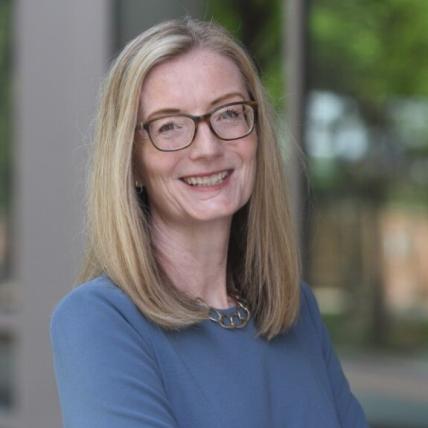
Christine Chabot, a new member of the Marquette Law School Faculty, describes her teaching style as interactive and engaged. “An engaged classroom encourages students to think deeply about the law – and to go beyond the shallow level of merely memorizing current legal requirements. It’s what students will need as practicing lawyers. The law may change after graduation, and if students don’t understand the underlying reasoning, they won’t be prepared for change. Students need to understand why the law is the way it is.”
Chabot enjoys teaching because she believes it’s a great way to give back to the next generation of lawyers. “I enjoy hearing students’ fresh perspectives. Also, I think teaching is a wonderful way to improve the legal profession. I strive to provide opportunities for all students to grow and learn; whether it’s asking questions, exploring new topics, or mastering a new area of law.”
This fall she is teaching administrative law, an area of expertise. The class addresses the procedures and political structures that govern administrative agencies’ decisions. These agency decisions establish critical policies and legal requirements at the federal and state levels and address topics ranging from the purity of the air we breathe and the water we drink, to student loans and mortgages, to the safety of airplanes and automobiles, and so much more. Chabot says it’s an especially exciting time to study this topic. This semester she looks forward to teaching students about pending Supreme Court cases that could upend several pillars of administrative law. “There’s never a dull moment” she adds.
Chabot’s recent scholarship also focuses on important questions of administrative law as well as constitutional law. In a piece that is forthcoming in the Virginia Law Review, Chabot addresses a new and impending war over the constitutionality of broad delegations of spending power to the executive branch. While critics have challenged Congress’s delegation of broad spending authority to an administrative agency known as the Consumer Financial Protection Bureau, Chabot argues that the history and text of the Constitution support such a broad grant. The Supreme Court will rule on the constitutionality of the Bureau’s funding structure this term.
Chabot graduated from Norte Dame Law School and taught at Loyola University of Chicago Law for over 10 years. She also clerked for the U.S. Court of Appeals and practiced at national law firms.
She says her greatest accomplishments include helping students begin their legal careers and the recognition that her research has received.
The best advice she received as a law student was to do a clerkship. Her advice to students is that “it’s important to network with as many practicing lawyers as possible. Explore a range of legal careers: in house, government, etc. - you never know what might be of interest down the road.”

